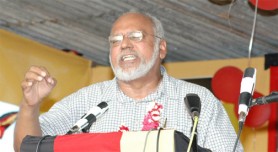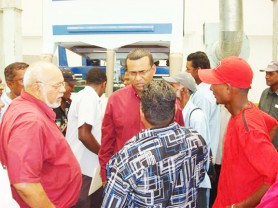Donald Ramotar, bar the shouting, seems to be the last man standing in the race for the nomination as the People’s Progressive Party’s presidential candidate.
Moses Nagamootoo, Ralph Ramkarran, Donald Ramotar and Clement Rohee – all members of the People’s Progressive Party’s Central Committee – indicated their interest in winning their party’s nomination as the presidential candidate for the 2011 general elections.
The selection of the party’s presidential candidate for the 2011 general elections is the central political issue facing the PPP at this time. No nominee has been announced but agitation has started and the selection question has polarised public opinion. The problem that faces the four leading PPP contestants, however much they fancy their own chances, is that they are not popular with the electorate at large.

The Barbados-based Caribbean Development Research Services Inc – CADRES – which conducted the Guyana Public Opinion Survey earlier this year gave a surprising assessment of the leadership qualities of the most prominent PPP politicians. The Survey indicated that Bharrat Jagdeo and Robert Persaud – two party members who are unlikely to seek the nomination – are the most popular. Donald Ramotar and Ralph Ramkarran trailed far behind. Moses Nagamootoo and Clement Rohee were not even considered as serious contestants!
The PPP nomination process, apart from the contestants’ low popularity rating, has suffered from the ‘Jagdeo effect.’ Highly popular in 1997 when he took over from the aged and ailing Janet Jagan, Bharrat Jagdeo, his relative ranking in the opinion poll notwithstanding, has managed to convert his assets into an electoral liability and squander the PPP’s huge electoral support that he inherited from the disputed score of December 1997 general elections. Inheriting a tally of about 220,000 in 1997, he dropped to 210,000 in 2001 and 183,000 in 2006. Political pundits fear that the score would most likely drop further even if he were eligible to run again in 2011. His imperious style succeeded in alienating mature members of civil society and senior members of his own party.
The secondary ‘Jagdeo effect’ has been civil society’s sobering distrust of delivering the national presidency into the unpredictable hands of a thirty-something-year-old again. It is not surprising that, as a consequence, all four PPP contestants are now sexagenarians – Moses Nagamootoo, 63; Ralph Ramkarran, 64; Donald Ramotar, 60 and Clement Rohee, 60.
But it is Ramotar who – despite serving the PPP for over 44 years – has never held public office, unlike his rivals. Both Nagamootoo and Rohee have served as cabinet ministers and Ramkarran, a prominent attorney-at-law is Speaker of the National Assembly and has chaired important constitutional and other commissions. Ramotar’s relative lack of experience outside of Freedom House shows. It is for this reason that he has been selected belatedly for a fast-track course in government and international relations. This is what ignited the ire of Comrade Nagamootoo and sparked public complaints of favouritism.
Favouritism

Moses Nagamootoo, the party’s most persistent and perennial presidential aspirant, publicly criticised the process which seems to favour Ramotar above his rivals. Nagamootoo, while appearing as a guest on Yesu Persaud’s television talk show – Eye on the Issues – questioned what he called the “state sponsorship” of Ramotar for the party’s presidential nomination. He complained “I see all of a sudden, I say this openly, that the General Secretary of my party is being put on the presidential bandwagon to attend cabinet outreaches. He features on presidential visits overseas…why is this done selectively?
Nagamootoo described Ramotar’s apparent preferment as disadvantageous to other candidates complaining “This is deliberately selective and unfair.” He felt that this could derail the selection process threatening that “if this continues, I will withdraw from the process.”
Ramotar was taken aback by Nagamootoo’s public attack, not his threat to withdraw. What must have been galling was the public exposure of the process. The former seemed offended equally by the veracity of the claim as by the latter’s audacity in making “internal party matters public.”
There is no disputing that Ramotar has been given favourite treatment. The
recent record shows that he was appointed to lead Guyana’s delegation to the 3rd African, Caribbean and Pacific and the European Union Regional meeting of the Joint Parliamentary Assembly (Caribbean Region) in February 2009. He was also included in official delegations for visits to the Middle East and Far East side-by-side with cabinet ministers and has participated in Cabinet outreaches by the government despite not being a member of Cabinet. These ‘outreaches’ are thinly-disguised, state-funded election campaigning and have been an inexpensive ‘meet-the-people’ opportunity for Ramotar.
He accompanied Agriculture Minister Robert Persaud on a visit to Siriki in the Pomeroon River and was seated, along with President Bharrat Jagdeo and Prime Minister Samuel Hinds at the head table at the official luncheon for Surinamese President Désiré Bouterse. An unconfirmed report in the Stabroek News newspaper suggested that he was being considered for appointment as Minister of Local Government and Regional Development to facilitate his familiarisation with the countryside and the rural and hinterland population. Such a move would contribute to burnishing his image in the forthcoming election campaign.
PPP Central Committee member Dr Roger Luncheon in his role as Cabinet Secretary and Donald Ramotar as Party General Secretary were forced to explain the blurring of the line between state and party. Luncheon wordily referred to Ramotar’s elevation as indicative of the role that the ruling party plays in the administration of the country. He said that Ramotar, as the general secretary of the ruling party, continues to contribute “ideologically, programmatically and operationally” and that, based on this, “a place at the head table” is assured for him as well as “a role to play in the engagement of the government and the Guyanese people.”
Ramotar, for his part, was obliged to defend the patently skewed process by saying, “I am the General Secretary of the PPP and the PPP was elected to the government. In the final analysis, the party gains or loses on what the government does and I have to be interested in everything that happens in government.” He seems to see no difference between “interested in” and “participated in.”
Ramotar realised that he was the beneficiary of the same political transgression of which the People’s Progressive Party – then in the opposition – had accused the People’s National Congress administration decades ago. He claimed lamely that the PPP believed in a division between the party and government and did not support the notion of party paramountcy. “But we don’t believe in building a wall between the two. The government was elected on the manifesto of the party.” In this case, the “wall” has all been demolished.
Factionalism
The knives are out! Ramotar has had to counter two major challenges in his quest for confirmation as the PPP’s candidate. The first came from a group calling itself the Guyanese Coalition For Jagdeo Third Term which had tried to make a case for the unconstitutional re-election of the President. The group, evidently well-funded and probably enjoying the encouragement of high government officials, distributed flyers and buttons promoting the extension of presidential term limits to pave the way for Jagdeo to contest again. It plastered posters on city walls with the slogan, ‘Jagdeo for President in 2011.’
Ramotar had to move quickly to protect his own prospective candidacy and to prevent the Jagdeoite manoeuvre from gaining momentum. He lashed out at veteran PPP Central Committee Member Reepu Daman Persaud who was among the first to endorse Bharrat Jagdeo for a third term of the presidency. Persaud – who is President of the Guyana Hindu Dharmic Sabha – tactically timed the delivery of his call to a rally at the annual Diwali motorcade confident that his message would resonate with the huge Hindu community. Ramotar reiterated darkly that “…the PPP remains with the Constitution. What Mr Persaud said reflected his personal views on the issue and not the party’s position.” The message, however, was already delivered to the audience.
The second open challenge has now come from Moses Nagamootoo who, unlike Reepu Daman Persaud, had no live audience to address and had to resort to the TV talk show. He argued that, although it is quite evident that collective decision-making is practised at the level of the executive committee, the question of the nomination for the presidential candidate in the forthcoming general elections seemed to be far removed from the uncertainties of the democratic process.
Nagamootoo, after boasting of his fifty-year membership of the party, has suddenly realised that “the selection process was outdated and a broader consultation with the party’s membership was now required.” He complained on Yesu Persaud’s TV programme that “There is a selection mechanism but I have felt that this is inadequate. Traditionally, the Executive Committee of the party would make a recommendation and put the recommendation to the Central Committee (the Executive Committee is 15 and the Central Committee is 35 members). The Central Committee is elected by the Congress which meets periodically once every three years. Now, for me, that process would be relevant where you had a single candidate because we never had a plurality for president…So I feel that, with a plurality of candidates, the process ought to be broadened and widened to include the members of the party.”
Nagamootoo learnt, too late perhaps, that Ramotar has benefitted from the flawed system of ‘democratic centralism’ to which he himself subscribed. The self-indulgent leadership cabal has been satisfied with the system since Cheddi and Janet Jagan consolidated their grip after the infamous 1956 Congress that terminally split the party. Nagamootoo knows only too well how that system functions. Yet, he bellyached, “I have been elected with high votes by the members of the party but I could not have been endorsed by the 35 members who constituted the Central Committee to be among the 15 members of the Executive Commit-tee.”
In the final analysis, it is clear that all four contestants are cut from the same cloth. They know too well that the Central and Executive Committees control the party organisation between congresses and whoever controls the two committees will influence the modalities for the selection of the candidate. General Secretary Donald Ramotar is the man who wields influence there right now. Since the PPP expects to win the general elections, the candidate so elected will control the country.
The year 2010 should have been the Party’s celebratory ‘diamond’ 60th anniversary year But it has gradually turned into in a family feud. Fuelled by ambitions for the nomination in national elections that must be held within the next eleven months, the contest has exposed the worst side of the party’s internal processes. The party is riven by rivalry and Ramotar has striven to consolidate his grip on the influential, decision-making Central and Executive Committees. Ordinary party members have little say and no control over the outcome.
The reality is that, as the election campaign enters its last months, Donald Ramotar, the ultimate insider, seems to have succeeded in fighting his rivals to a standstill. Of the candidates that started the race at the beginning of the year, he will be the only man left standing when the dust had settled.

